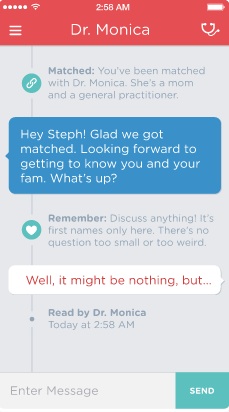 San Francisco-based First Opinion raised $1.2 million in a seed round led by Felicis Ventures with additional funding from Greylock, Yuri Milner, and 500 Startups to try to meet the demand for First Opinion's patient-to-doctor in-app messaging system.
San Francisco-based First Opinion raised $1.2 million in a seed round led by Felicis Ventures with additional funding from Greylock, Yuri Milner, and 500 Startups to try to meet the demand for First Opinion's patient-to-doctor in-app messaging system.
First Opinion aims to primarily target their app towards parents. The app acts as a communication system for users to ask doctors health-related questions, including questions about pregnancy, child development, illness and injury, lactation, nutrition and sleep training. All the doctors are also moms, CEO McKay Thomas told MobiHealthNews. Users, once matched with a doctor, can text that same doctor for the every question they have.
Thomas said that currently, the company is seeing around 700 consultations per day.
Thomas said that doctors generally think their role is to deal with patient's serious problems whereas patients visit doctors just to get peace of mind about any number of questions or concerns. According to Thomas, this is what contributes to longer wait times and shorter appointments, which he believes can be avoided with First Opinion.
"What we realized is if we wanted to change the experience and actually provide a very high quality doctor experience, we had to be very selective with what doctors we worked with, so the way to do that is by building your own doctor network," Thomas said. "You can't actually have a part-time doctor who is getting the lion's share of their income from someone else and get them to change their bad habits. The only way you get doctors to change their bad habits is by becoming their primary source of income."
While he wouldn't share any actual numbers, Thomas claims First Opinion has tripled the size of its doctor network every month.
Thomas emphasized that this product is not meant to diagnose users, but instead, help them answer simple questions. The first time users contact a doctor with First Opinion the exchange will be free, but after that time, First Opinion will charge patients $9 a month for unlimited messaging with the doctor they are matched up with through the service.
Users of First Opinion also do not have to provide any personal information before consulting with the doctor, because this not only helps the company avoid HIPAA concerns, but also because Thomas believes this information isn't needed.
"We have some really great attorneys that have helped create some frameworks that we can operate within that can keep us completely legal," Thomas said. "One of them is this anonymous issue. The thing is it actually works on a lot of levels. It’s not just because of HIPAA -- it’s actually because everyone is talking about how we need more encryption, but I think we need to be taking a step back and looking at business models. And we need to say: 'Do we actually need all the pieces of information that we are requiring?' We have startups saying 'Now we’re going to take your medical records and we're going to look at your kids' medical records' without actually thinking about if we want that."
Keeping First Opinion anonymous, Thomas said, helps his company create a "frictionless" user experience.


















